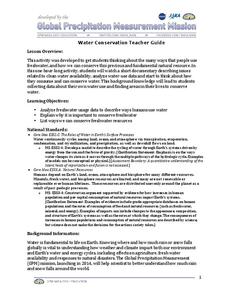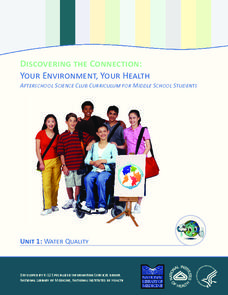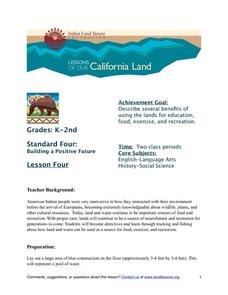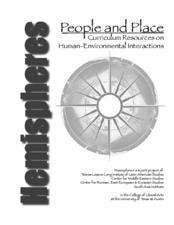Curated OER
Water Conservation
Open learners' eyes to the challenge of finding safe drinking water – something we often take for granted in our country. The PowerPoint presentation includes images, graphs, diagrams, and even a video to stimulate discussion on how we...
Berkshire Museum
Where’s the Water?: Acting Out Science Cycles
Young scientists transform themselves into rivers, oceans, clouds, and drops of water in order to explore the water cycle. After assigning and explaining to students their different roles in the activity, the teacher reads aloud a...
Curated OER
WATER HERE AND THERE
Introduce the topic of water conservation with a little drama. Dressed as snowflakes, hail stones, or rain drops class members dramatize the events in a narration of the water cycle. The series of lessons that follow focus on...
NASA
The Case of the Wacky Water Cycle
Join the tree house detectives in learning about the processes of the water cycle, water conservation, water treatment, and water as a limited resource.
NASA
Cleaning Water
From their sweat to the water vapor in their breath, astronauts recycle every possible drop of water while in space. After watching a short video describing the different ways materials are recycled and reused in space shuttles, young...
Baylor College
How Do We Use Water?
Send youngsters home to survey how they use water in their homes. Then bring them together to discuss which uses are essential for our health and which are not. A helpful video offers teaching tips for this lesson, and a presentation...
Water
Global Water Supply Elementary School Curriculum
Water is the focus of an interdisciplinary unit that brings awareness to its daily use around the world and the importance of conservation. Worksheets challenge scholars to match words and definitions, trace, complete a maze, and solve a...
National Library of Medicine
Your Environment, Your Health: Water Quality
How important is water quality where you live? The first module in a six-unit series includes four lessons on water quality. By applying the concept directly to the lives of pupils, they engage in meaningful learning. They read about...
University of Waikato
Water Issues
Water may be everywhere but it is not always drinkable. Pupils research water issues, first in a local setting and then with Papua New Guinea and Australia to get a larger world perspective. Teams use the Internet and other resources to...
EduGAINs
Go H2O! Investigating Residential Water Systems
Before your learners excuse themselves to get a drink at the water fountain, prompt them to think about where that water comes from. A middle school science instructional activity encourages groups to research their community's source of...
Environmental Protection Agency (EPA)
The Case of the Mysterious Renters
Upper-elementary kids examine the water usage in their own home, then use that data to solve a case in which a landlady is trying to determine how many people are living in an apartment being rented. Combine math, scientific method, and...
California Academy of Science
Sustainable Water Solutions: Weighing the Pros and Cons
Switching indoor water fixtures to low flow reduces water usage by more than 45 percent. This and other solutions to reduce water usage have both pros and cons. Scholars view videos of different solutions, discuss them in small groups,...
Indian Land Tenure Foundation
Gifts from Land and Water
With a series of fun hands-on simulations, young children can learn about conservation and natural resources. Your learners become land detectives, discussing and investigating the gifts that the land and water provide them. They then...
California Academy of Science
Your Hidden Water Footprint: Defining a Problem to Find a Solution
One 17-ounce bottle of Cola requires around 46 gallons of water to produce. How is that possible? Young scientists learn about the hidden water used to produce everyday items. They research, discuss, and look for ways to reduce water...
Environmental Protection Agency (EPA)
Teachers' Guide to Using A Day In the Life of a Drop
Hydrology hopefuls learn about their local watershed. Through discussion and online interactives, they see that their habits affect the water supply. The lesson concludes with a pledge to filter out bad water usage habits. It makes a...
Safe Drinking Water Foundation
Make Your Own Water Pollution
Using the polluted water that was made in the prior lesson, your young environmentalists will mix pollutants together in an experiment. Then, they will design a water filter that will clean the polluted water to use in the next lesson....
Safe Drinking Water Foundation
Water Bottles Everywhere
Young environmentalists examine how water bottle use is polluting the waters on our earth. In groups, your students study the handout on their assigned topic and present their findings to the rest of the class. Leading up to this lesson,...
Safe Drinking Water Foundation
Types of Water Pollution
In groups, young environmentalists investigate water samples that are contaminated with different types of pollutants. Each group presents their findings to the class and fills out the "Types of Pollutants Chart." This lesson is meant...
Safe Drinking Water Foundation
Demonstration of Water Pollution
In this teacher-led demonstration, your young environmentalists will observe and record how different types of water pollutants look when they are combined. From here, individuals will develop a hypothesis on how the water can be...
Safe Drinking Water Foundation
Cause and Effect of Water Pollution
Your students will become aware of and be able to list the major types and sources of water pollution. Being able to recognize that the household, agriculture, and industry sectors of society contribute to water pollution, is the main...
Curated OER
Impulse, Momentum, and the Conservation of Momentum
What happens when two worlds collide? In the first of several activities, future physicists experiment with colliding ball bearings or Newton's cradle. Another activity requires the use of an air track with cars to examine collision....
San Francisco Public Utilities Commission
Water from the Well
How much water does it take to brush your teeth? How about to wash your clothes? Perform an experiment that measures water usage in everyday tasks and compares them to the days before indoor plumbing, specifically the California gold...
EngageNY
Forming a Research-Based Claim: Stakeholder Chart on Better Agricultural Water Management
How can industries manage water more sustainably? Building on the previous activity, scholars explore the topic by creating a stakeholder chart for agricultural water management. Next, they participate in the World Café discussion...
Curated OER
Hemispheres: People and Place
Here is an astounding series of lessons, designed for high schoolers, on environmental policy. By studying water conservation in rural India, the role of the government, and the reaction of the people, learners begin to formulate...
Other popular searches
- Water Conservation Activity
- Soil and Water Conservation
- Water Conservation Grade 5 6
- Water Conservation Florida
- Water Conservation Brochure
- Water Conservation Essays
- Water Conservation Programs
- Drought, Water Conservation
- Water Conservation Graphing
- Conservation of Mass Water
- Conservation of Water
- Drought Water Conservation

























